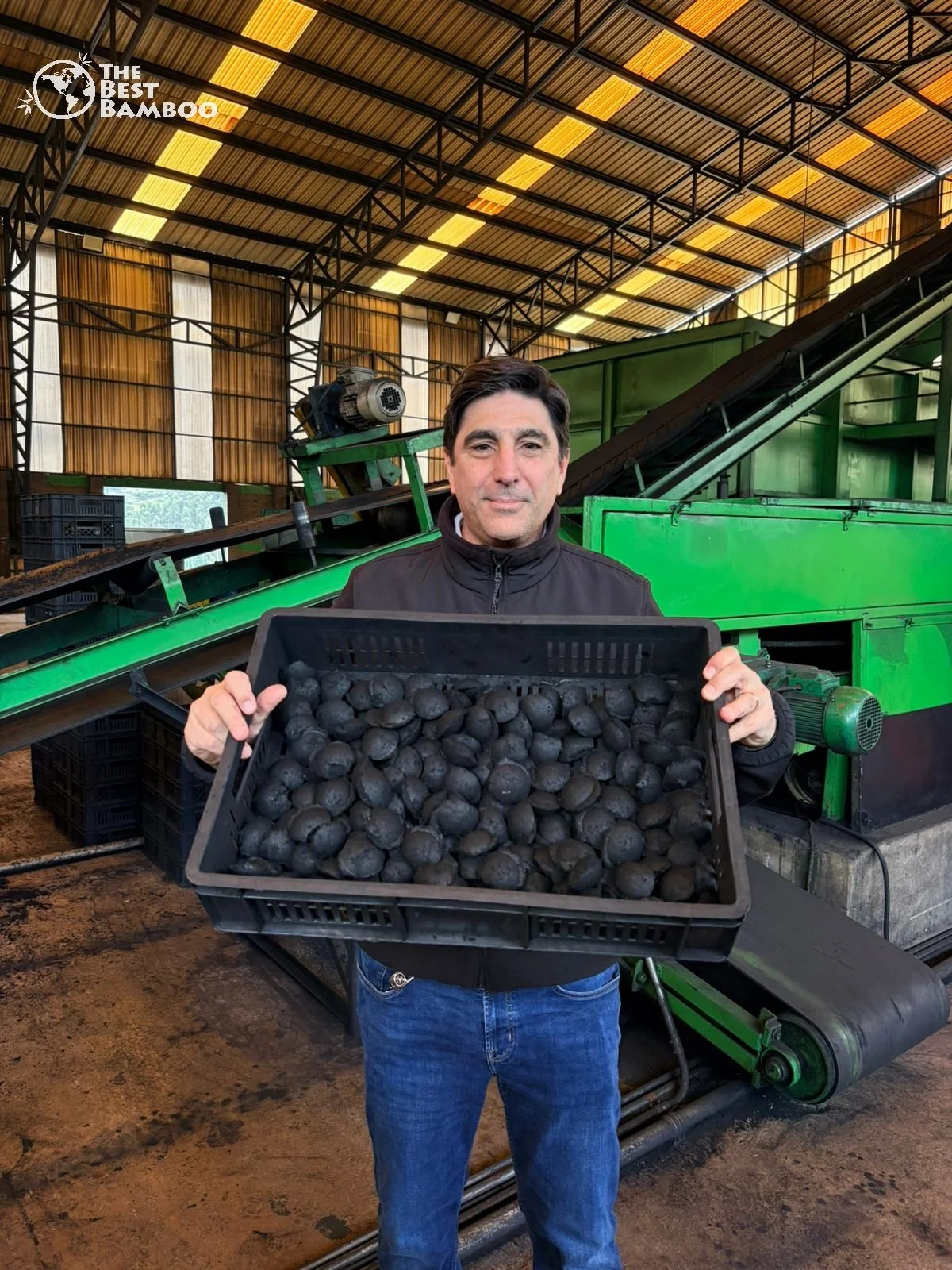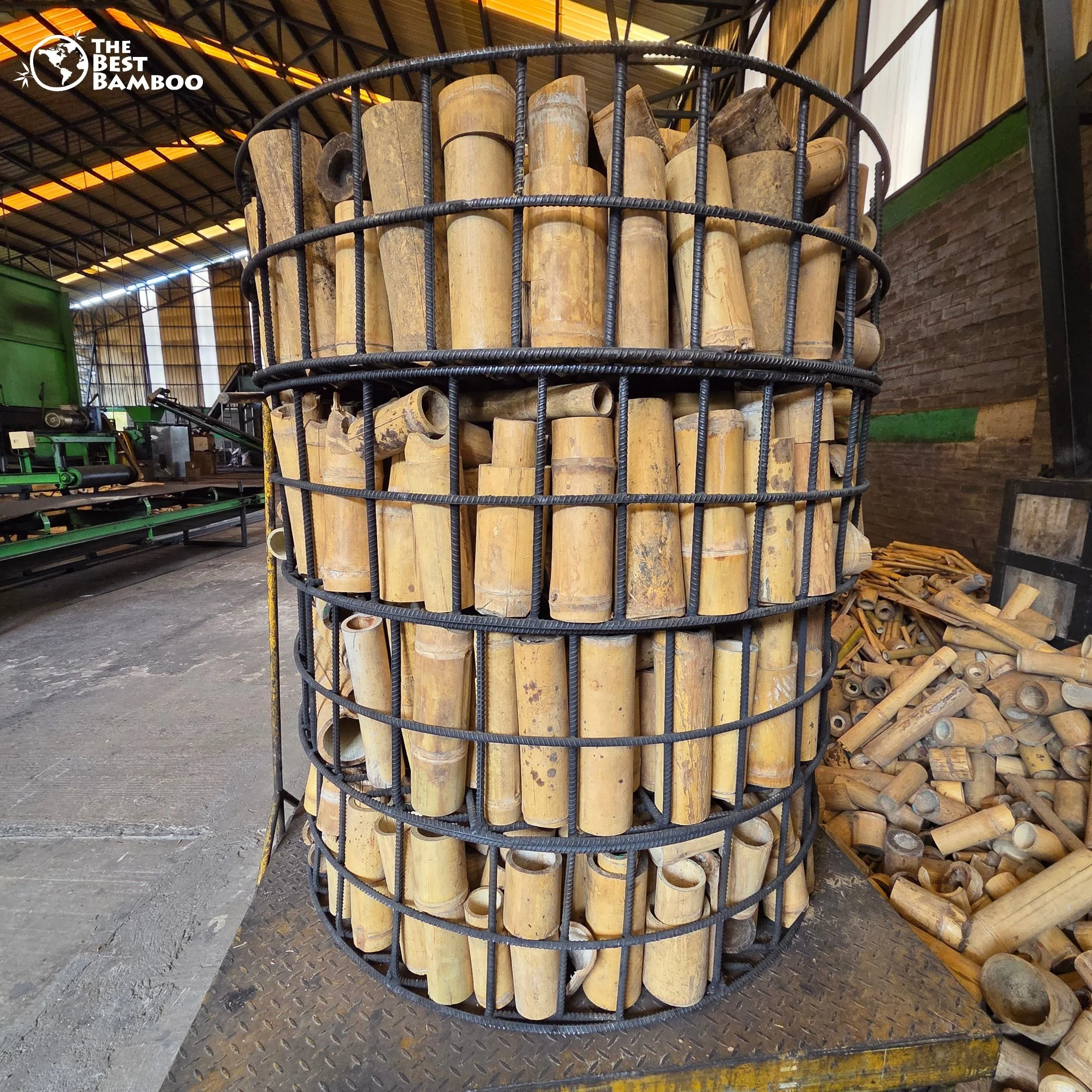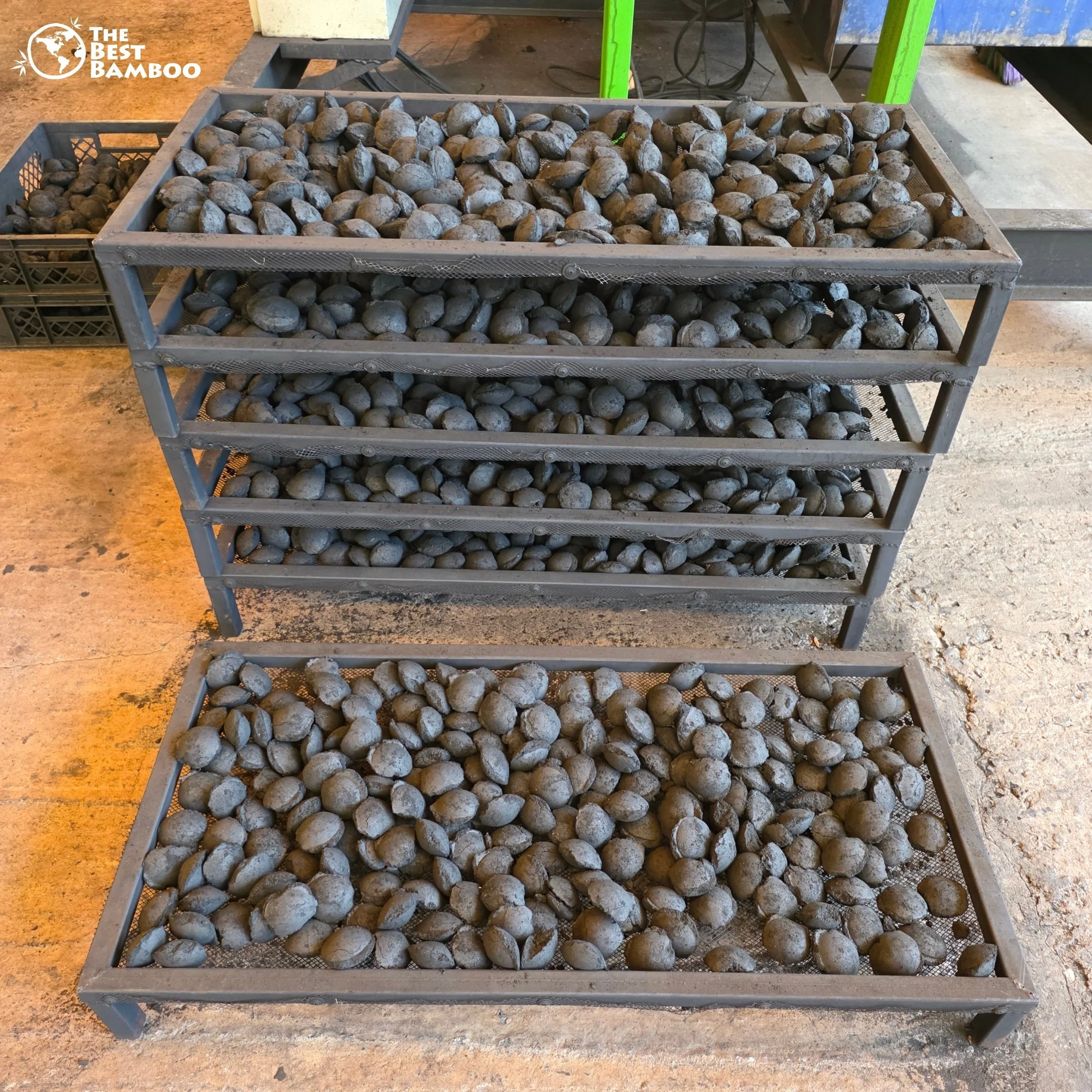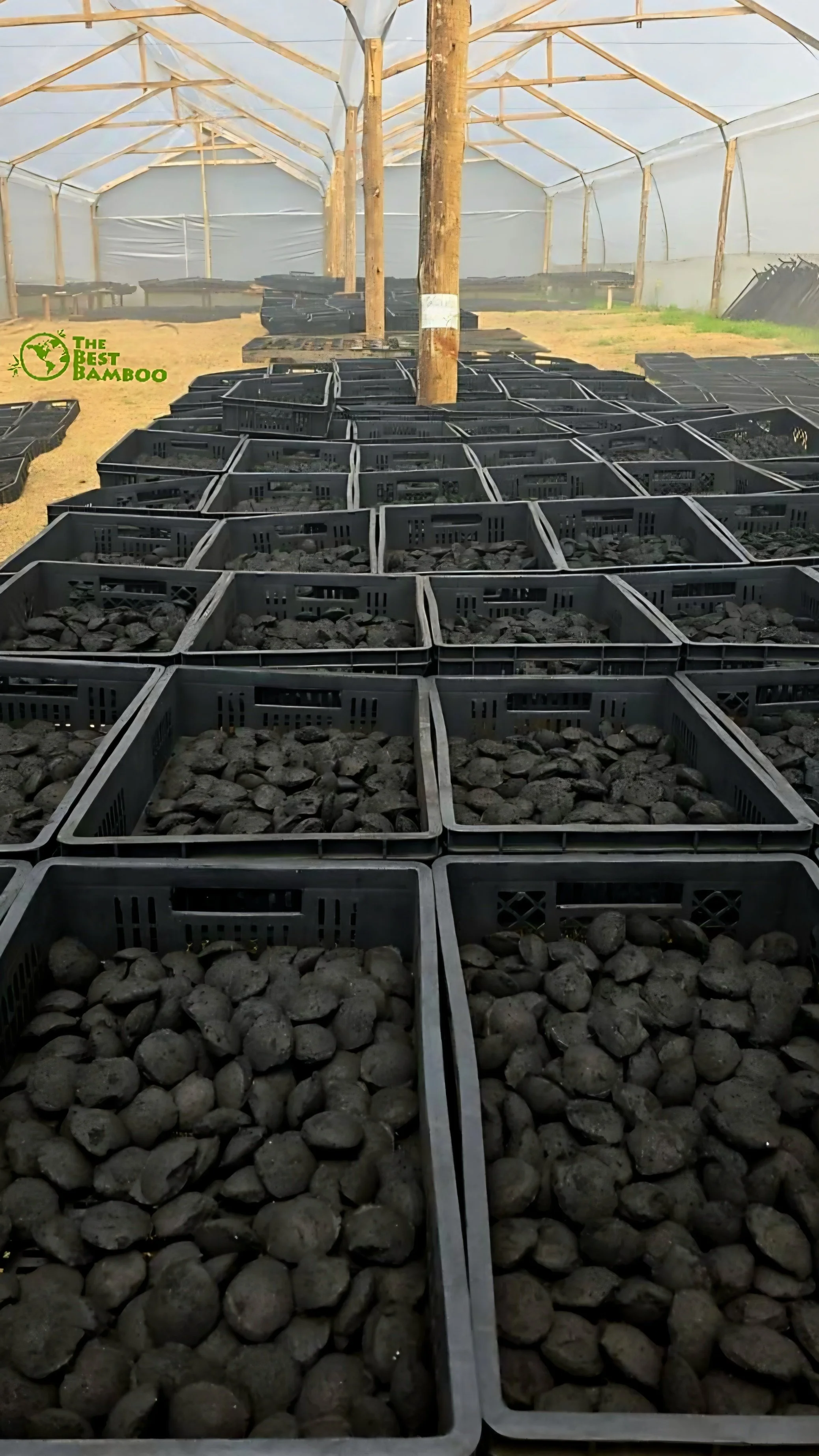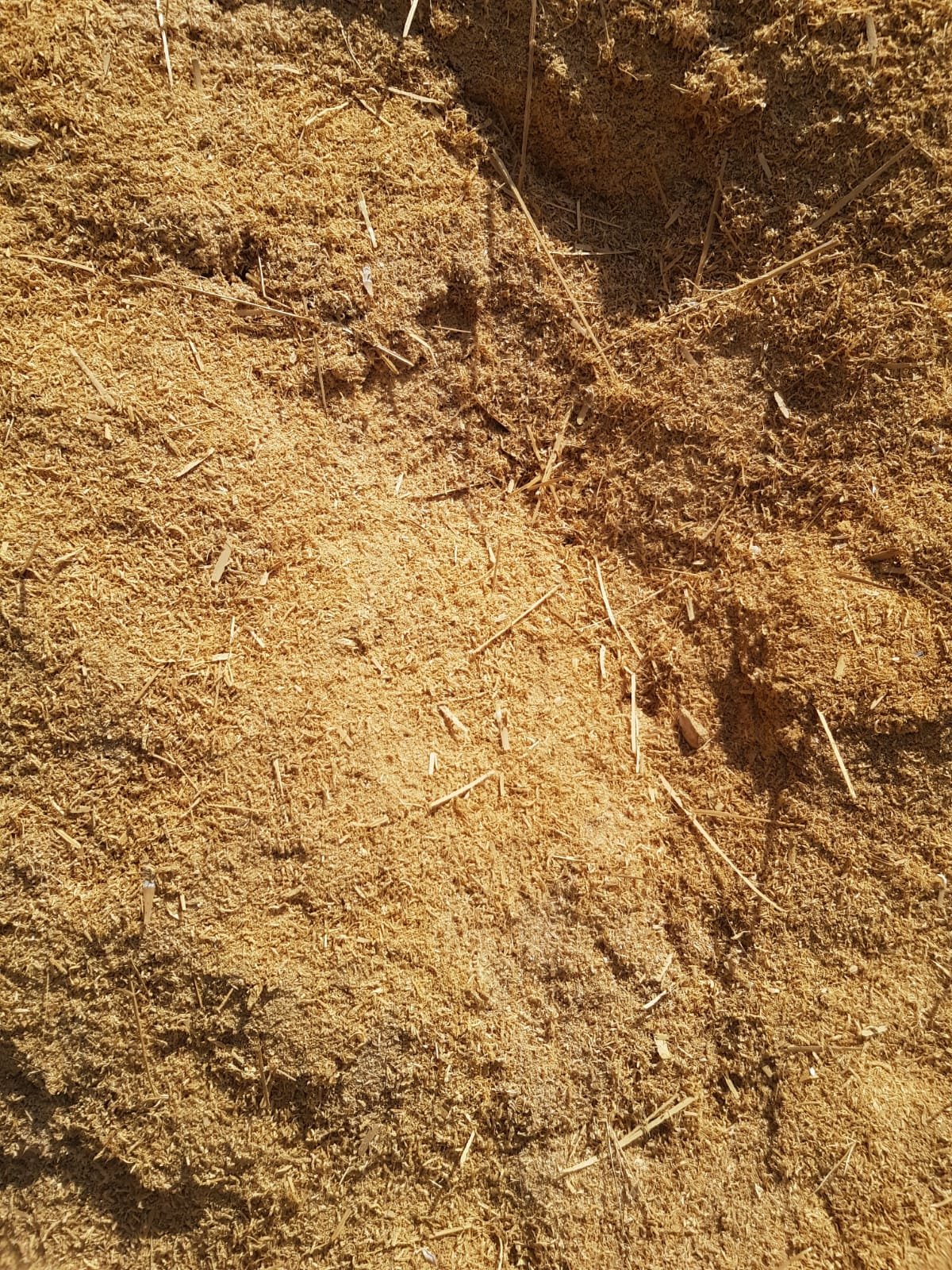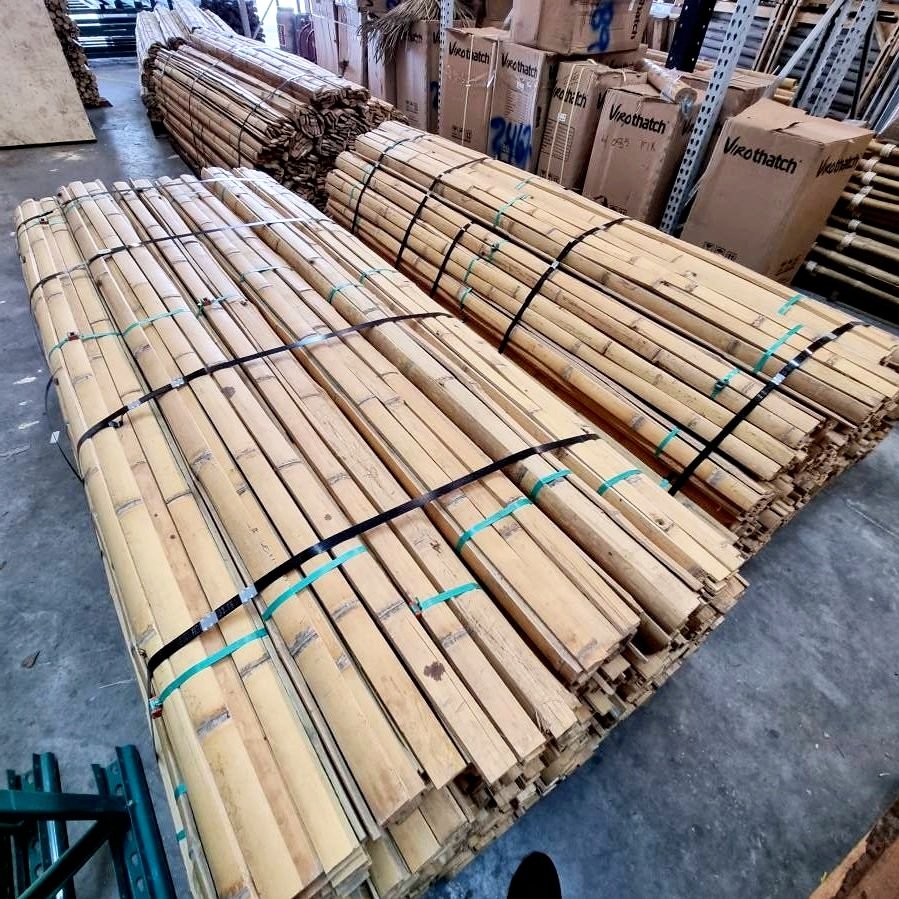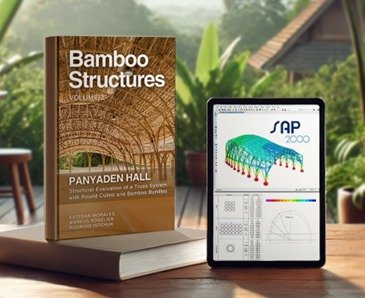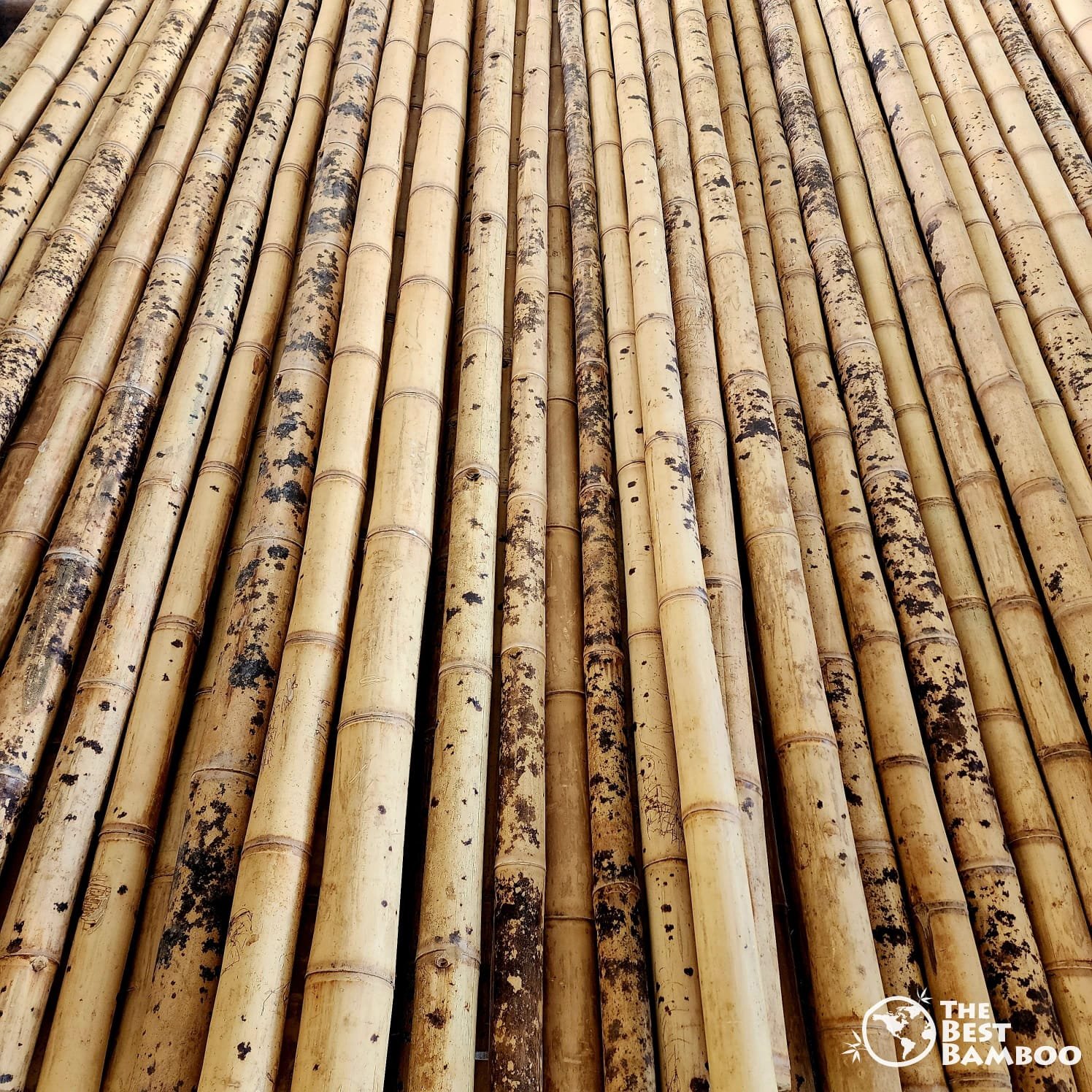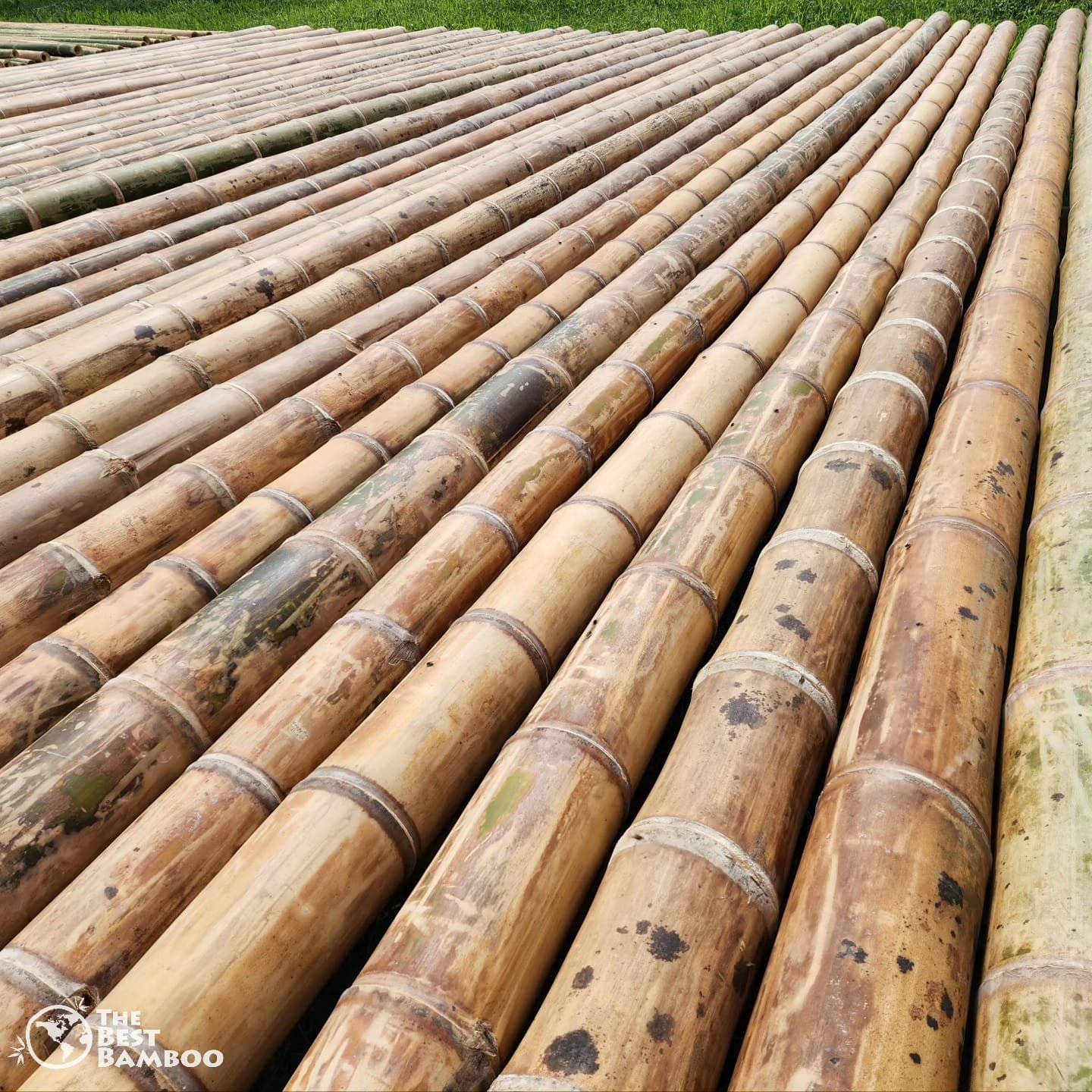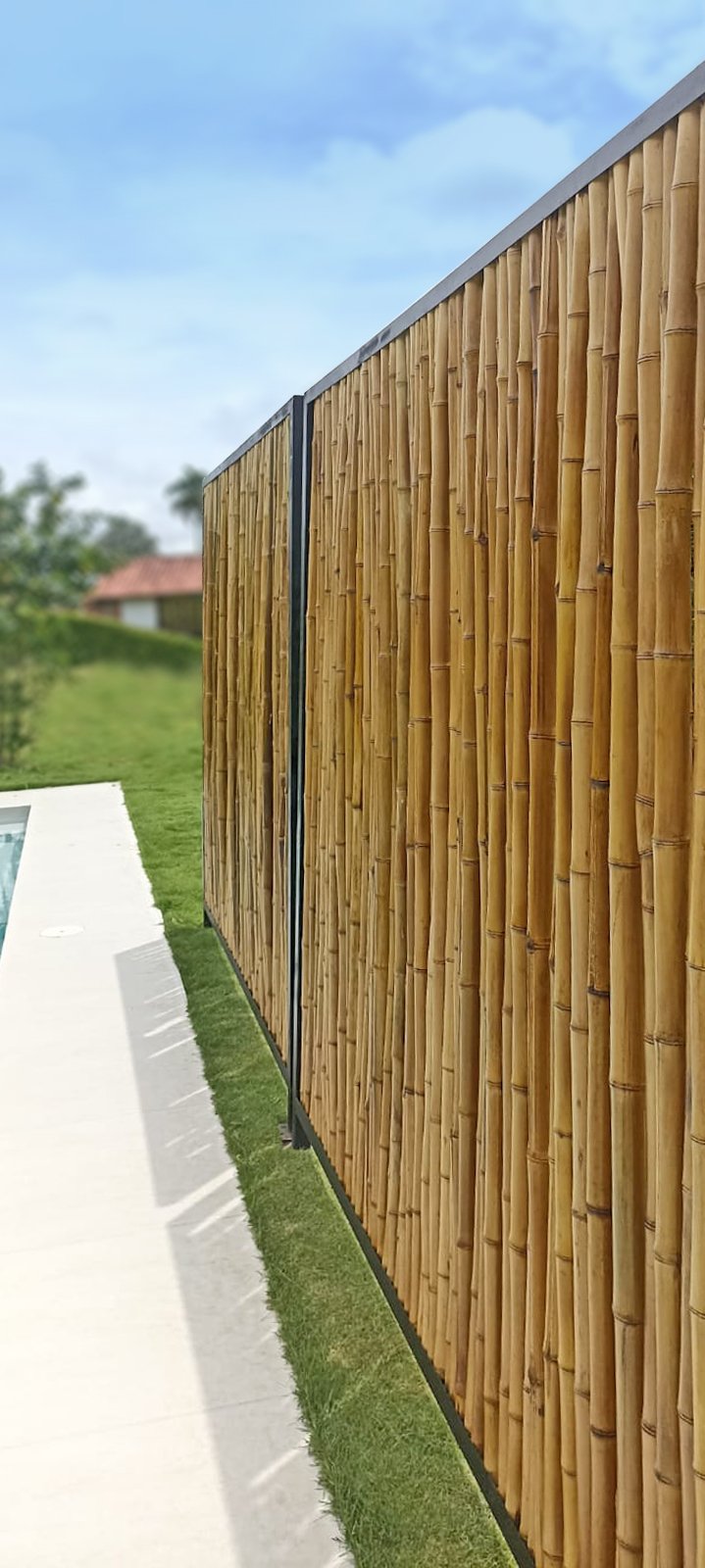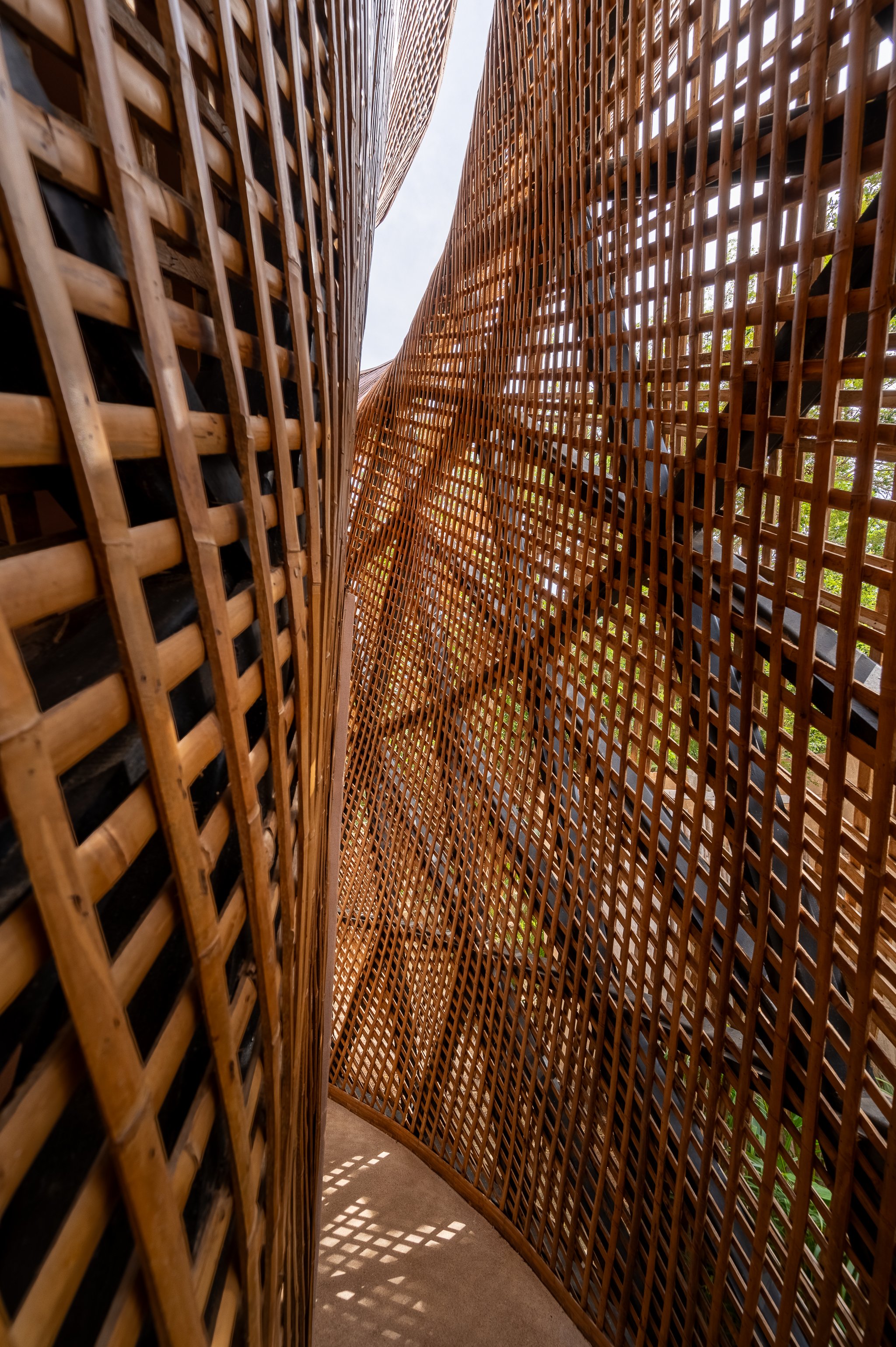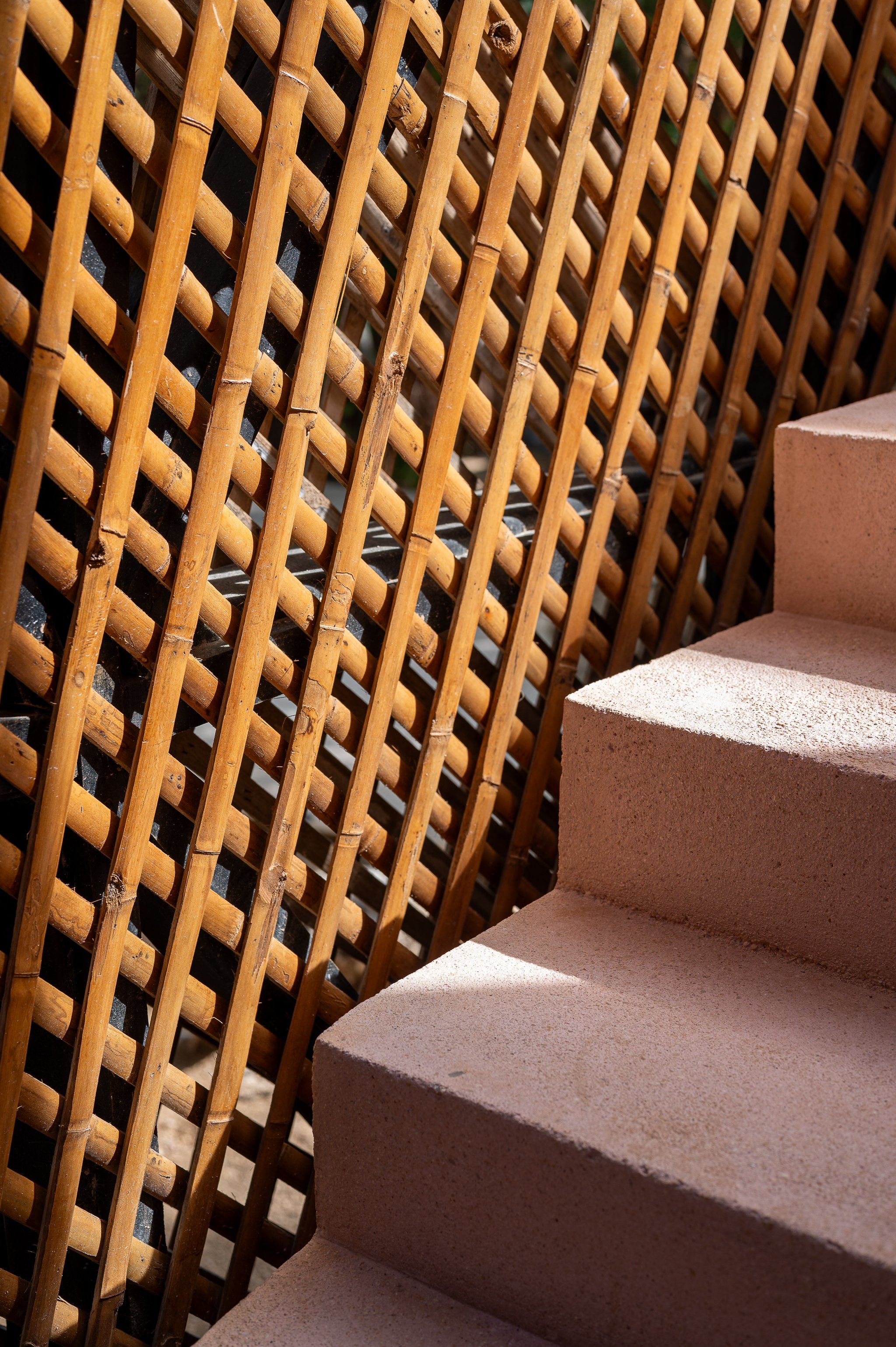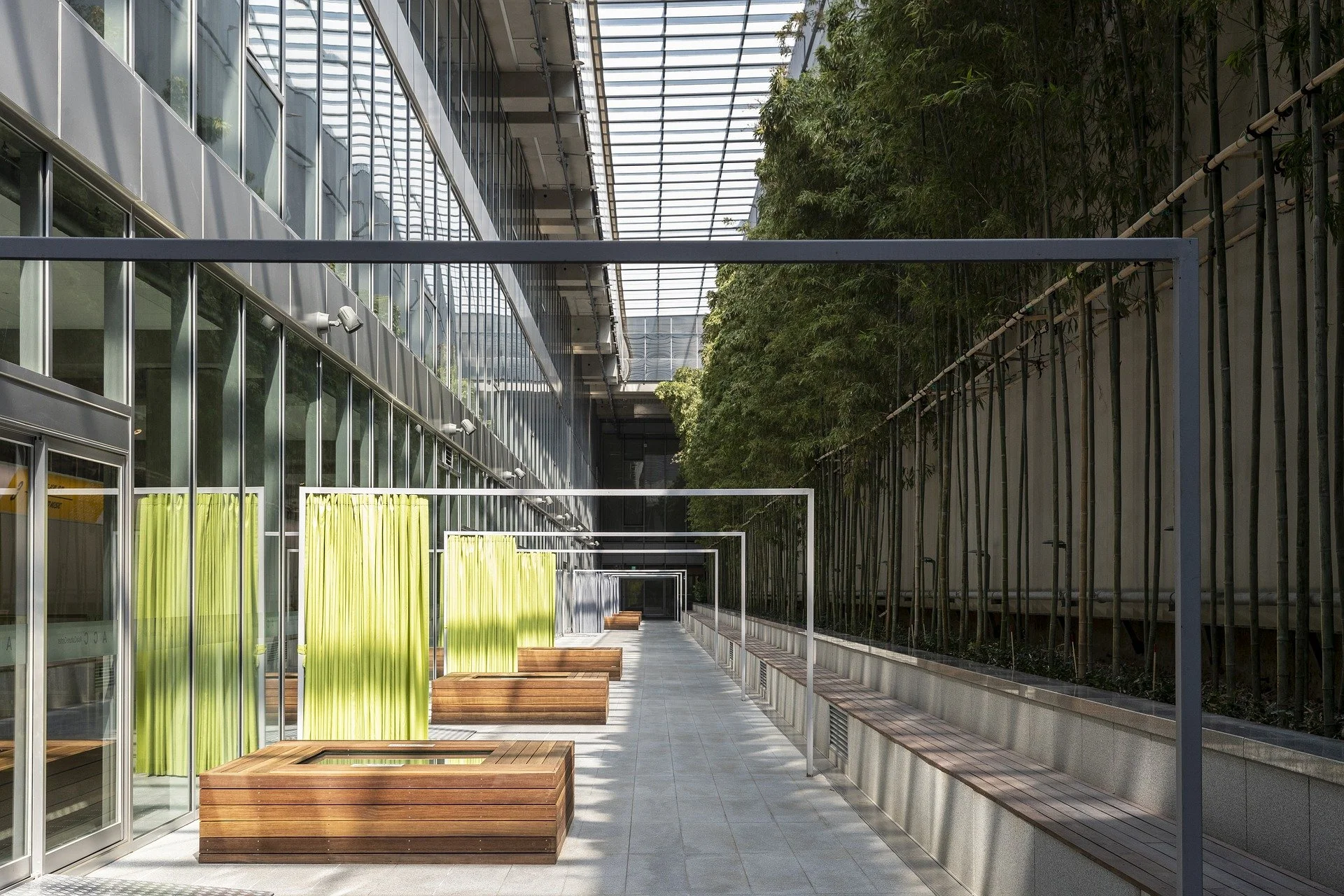Santiago Perdomo—Founder/CEO of The Best Bamboo®
The Best Bamboo has proudly joined forces with Carbobrik to pioneer the world’s first sustainable pyrolysis bamboo charcoal made entirely from Colombian Guadua. This joint work began months ago with rigorous R&D to refine every step of carbonization. Now that laboratory evaluations are complete, the vision is becoming a reality: eco-friendly charcoal briquettes that burn clean, reduce odor, minimize moisture, and even help cleanse air and surfaces thanks to their natural porous structure. Soon, our power briquettes will be available worldwide for both cooking and industrial fuel.
Inside every Colombian bamboo charcoal briquette lies the chemistry of Guadua — a renewable material with remarkable absorb capacity and the purity needed for safe heat. Enhanced through controlled pyrolysis, it burns longer and cleaner than regular charcoal, with fewer impurities, less smoke, and almost no toxicity. This review brings together the science, sustainability, and the broader uses of bamboo charcoal, from grilling to air purification, skincare, gardening, and more.
1. What Are Bamboo Charcoal Briquettes and Why Is Guadua So Special?
Bamboo charcoal briquettes are compact blocks made from carbonized bamboo stalks processed under oxygen-free pyrolysis. The thick-walled, mature Guadua bamboo of Colombia naturally produces a carbon-rich material with high density, superior surface area, and excellent moisture control.
Pyrolysis transforms bamboo into a stable carbon material with low chemical reactivity and reliable heat performance. Because the bamboo’s porous structure stays intact, each briquette can both burn efficiently and absorb odor, toxin, and impurity particles — properties that explain why bamboo charcoal has been used for centuries in Asia for cooking, deodorizing, and detoxifying.
Unlike wood fuels, Guadua briquettes are eco-friendly, sustainable, and free of harmful resins. They leave minimal ash, reduce smell, and burn uniformly — proof that bamboo charcoal is produced with cleaner chemistry than industrial fuels.
Regular vs. Activated Bamboo Charcoal: What Sets Them Apart?
At the heart of bamboo charcoal’s effectiveness lies its astonishing internal surface area. Even as a standard, non-activated product, a single gram of bamboo charcoal hides within it hundreds of square meters of microscopic pores—plenty of real estate for trapping impurities, odors, or moisture. But the story doesn’t end there.
Through a process known as activation, usually involving high-temperature steam or specialized chemical treatments perfected in places like South Korea, the internal structure of bamboo charcoal is further enhanced. This activation doubles the available surface area within each gram, dramatically increasing its adsorption power. Essentially, activated bamboo charcoal becomes a “super sponge,” able to capture and hold onto contaminants more effectively than its non-activated counterpart.
In practical terms:
Regular bamboo charcoal: Excellent for purifying air, absorbing odors, or filtering water due to its naturally high porosity.
Activated bamboo charcoal: Takes purification to the next level by offering an even greater binding capacity, making it a preferred choice for industrial filtration, medical detoxification (like in Brita and Katadyn filters), and highly sensitive air purification systems.
Both forms leverage the genius of Guadua’s architecture, but activation unlocks the full potential hidden within every stalk—giving you more power per gram.
Bamboo Charcoal Briquettes
2. How Are Colombian Bamboo Charcoal Briquettes Manufactured?
Production begins in Colombia’s bamboo regions, where Guadua stalks are harvested and sun-dried to remove excess moisture. Once dried, the bamboo is ground into fragments and processed through controlled pyrolysis with nitrogen flow. This oxygen-free environment prevents burning and allows carbonization to occur cleanly.
Pulverizing Guadua to form uniform fragments
Volatile chemical compounds are eliminated safely, leaving behind a carbon matrix with exceptional absorption rate. After cooling and sterilization, the material is compressed into uniform briquettes.
Compacting Pulverized Bamboo into Briquettes
This eco-regulated system meets global standards across Asia and Korea, reduces emissions, protects the bamboo’s natural carbon structure, and keeps the end product chemical-free while ensuring a long-lasting, eco-friendly burn.
What Certifications Signal Truly Sustainable Charcoal?
For peace of mind at the checkout, keep an eye out for reputable certifications that signal real environmental responsibility. The gold standard worldwide is the Forest Stewardship Council (FSC) label—widely recognized for ensuring the bamboo or wood was harvested according to strict sustainability and ethical practices. Other legitimate marks include Rainforest Alliance Certified or EU Ecolabel.
A few tips:
Look for labels indicating responsible forestry, such as FSC or PEFC.
Seek out packaging that mentions “sustainably sourced” or “carbon-neutral.”
Check for compliance with international environmental standards where possible.
These badges are more than just marketing—they help guarantee your briquettes are as gentle on the planet as they are powerful on the grill.
3. What Makes Bamboo Charcoal’s Chemical Composition Unique?
Pyrolyzed bamboo charcoal contains millions of microscopic channels that increase surface area, enabling efficient heat release and rapid absorb action. Each carbon particle behaves like a tiny reactor that stabilizes combustion while reducing harmful by-products.
Lab assays show:
lower toxicity
higher adsorption
better heat performance
reduced formation of pollutant and harmful compounds
This explains why it’s ideal not only for grilling but for skincare, air purifiers, soaps, and mask formulations where cleanse and purify performance matters.
What Scientific Research Supports the Effectiveness of Bamboo Charcoal in Odor Control and Pollutant Removal?
For those who like to see the data before jumping on the bamboo bandwagon, established research backs up bamboo charcoal’s powerful filtering abilities. Numerous laboratory studies, including a noteworthy investigation by Nagaoka University of Technology in Japan, have explored how bamboo charcoal captures and neutralizes airborne contaminants.
In controlled tests, charcoal produced at various carbonization temperatures was evaluated for its ability to absorb common indoor pollutants such as formaldehyde, toluene, and benzene—the very chemicals often linked to “Sick Building Syndrome.” Results revealed that bamboo charcoal efficiently adsorbs these toxins across a broad range of processing temperatures, dramatically reducing airborne pollutants in confined spaces.
The adsorption didn’t stop with chemical vapors; even stubborn organic odorants like nonenal (a frequent culprit behind persistent household smells) were significantly diminished. Researchers concluded that bamboo charcoal can serve as a practical solution for improving indoor air quality, acting both as a deodorizer and a buffer against harmful gases.
In short, the science makes it clear: beyond its sustainable roots, bamboo charcoal delivers concrete, measurable benefits when it comes to cleaning the air we breathe.
How Does Bamboo Charcoal Help Purify and Improve Air Quality?
The secret to bamboo charcoal’s air-purifying prowess lies in its extraordinary internal structure. Each briquette contains countless microscopic pores—formed during the pyrolysis process—which act like a natural sponge for airborne impurities. This makes bamboo charcoal uniquely adept at trapping odor molecules, volatile organic compounds (VOCs), and everyday pollutants, without simply masking them with synthetic fragrances.
Unlike conventional air fresheners that often rely on perfumes and chemicals, bamboo charcoal quietly absorbs unpleasant smells from the air—leaving behind freshness rather than lingering scents or irritants. This fragrance-free approach minimizes allergic reactions and promotes a healthier indoor environment for people and pets alike.
Where can you put this to work? Bamboo charcoal effortlessly finds its place in enclosed areas prone to stubborn smells, from car interiors and gym bags to pet zones and refrigerators. Simply placing a bamboo charcoal sachet in these spaces allows the millions of pores to continuously attract and sequester offending molecules, whether from sports equipment, kitchen waste, or even newly painted rooms.
Additionally, bamboo charcoal removes common airborne contaminants such as ammonia, carbon monoxide, and small particulates—effectively reducing the presence of substances known to aggravate asthma and other sensitivities. Even leading commercial air filters use charcoal as a core filtration medium, harnessing its potent adsorption capacity to capture nuisance gases in both home and industrial settings.
Because bamboo charcoal is roughly four times more porous than traditional wood charcoal, its ability to purify the surrounding air is significantly amplified. Simply exposing the used charcoal to sunlight for a few hours each month also helps release trapped moisture and odors, revitalizing its performance for a year or more.
With its renewable origins, chemical-free composition, and exceptional effectiveness, bamboo charcoal offers a natural solution for cleaner, safer air—proving that true purification starts at the source, not with synthetic cover-ups.
How Does Bamboo Charcoal Function as a Natural Deodorizer Compared to Conventional Air Fresheners?
Bamboo charcoal’s unique molecular structure, created through pyrolysis, grants it exceptional odor-eliminating abilities. Unlike conventional air fresheners—which merely mask odors with artificial fragrances—bamboo charcoal actively adsorbs odor-causing molecules from the air. Its millions of microscopic pores act as tiny traps, capturing contaminants and neutralizing unwanted smells at the source, rather than layering on synthetic scents.
What sets bamboo charcoal apart is its ability to clean the air without adding any new chemicals, allergens, or volatile compounds. Many traditional air fresheners may contain ingredients that can trigger sensitivities or contribute to indoor pollution, especially in enclosed spaces like cars, bedrooms, or kitchens. Bamboo charcoal, in contrast, is both fragrance-free and non-toxic, making it an ideal solution for those seeking a safer alternative for themselves, their families, and even their pets.
This material is remarkably versatile: simply placing a bag of activated bamboo charcoal in areas prone to unpleasant odors—such as closets, shoe racks, refrigerators, or gym bags—naturally filters the surrounding air. Recharging the charcoal is as simple as exposing it to sunlight for a couple of hours each month, allowing it to release trapped moisture and restore its adsorption properties for continued use. Many users report these natural deodorizers remain effective for more than a year, significantly outlasting conventional options.
In short, bamboo charcoal doesn’t just cover up undesirable smells—it purifies the environment, leaving spaces fresher and healthier without the drawbacks of synthetic air freshening methods.
4. How Do Bamboo Charcoal Briquettes Outperform Conventional Charcoal? Why should you use bamboo charcoal?
Compared to regular charcoal, pyrolyzed Guadua briquettes:
retain more heat
emit fewer odors
produce less ash
absorb formaldehyde, benzene, and airborne allergen particles
re-burn more steadily
Strong research supporting bamboo confirms its superior adsorption and lower chemical residues during use.
Because bamboo regrows quickly and is renewable, it avoids the environmental damage caused by deforestation for lump charcoal or binchotan charcoal, while offering an eco-friendly path to clean energy.
How Does Sustainable Charcoal Support Carbon Sequestration?
When bamboo charcoal is produced using thoughtful, sustainable methods, the process can yield a remarkable side effect: biochar. This stable form of carbon, formed during pyrolysis, can be added to soil rather than simply being burned for fuel. By doing so, we effectively "lock away" carbon that the bamboo absorbed from the atmosphere as it grew.
Incorporating biochar into soil isn’t just a clever way to offset carbon emissions. It enhances soil structure, improves nutrient retention, and aids in water management—all while sequestering carbon for hundreds or even thousands of years. This means every batch of sustainably produced bamboo charcoal doesn’t just provide clean energy; it also plays a small role in fighting climate change.
So, when you choose bamboo charcoal from sources committed to responsible production, you’re supporting a regenerative cycle: fast-growing plants absorbing atmospheric carbon, efficient pyrolysis transforming them into powerful adsorbents, and any biochar created returning to the earth—ultimately helping to reduce the planet’s overall carbon footprint.
How Does Unsustainable Lump Charcoal Compare to Sustainable Lump Charcoal When It Comes to Carbon Emissions?
When comparing conventional lump charcoal made from deforestation with its sustainably produced counterpart, the environmental differences are stark. Unsustainable lump charcoal, typically produced in traditional earthen kilns, carries a hefty carbon footprint—upwards of 11 kilograms of CO₂ emissions per kilogram of charcoal. The process is not only energy-inefficient but also leads to significant methane release, thanks to incomplete combustion and leaky kilns. This potent greenhouse gas adds to the overall environmental burden.
In contrast, lump charcoal manufactured in modern, efficient kilns—often using responsibly sourced wood—has a much lower climate impact. These upgraded processes shrink the carbon footprint to around 2 to 3 kilograms of CO₂ per kilogram. Methane emissions, which are a major concern in older methods, are virtually eliminated due to better temperature control and airtight design. Some cutting-edge producers even take this a step further by capturing the by-product biochar, which, when added to soil, actually helps trap carbon and improve soil health.
In essence, not all lump charcoal is created equal: switching from traditional, unsustainable methods to modern, sustainable production can dramatically reduce both your carbon and methane emissions, all while supporting healthier forests and cleaner energy practices.
How Do Propane and Natural Gas Grills Stack Up Against Charcoal for Carbon Footprint and Methane Emissions?
When choosing between propane, natural gas, or traditional charcoal for grilling, it’s important to look beyond convenience and flavor—there are real differences in their environmental impact that are worth considering.
Charcoal, especially the kind produced from unsustainable sources with inefficient kilns, tends to leave the largest carbon footprint. Deforestation and energy-intensive processing can push emissions as high as 11 kilograms of CO₂ equivalent per kilogram of charcoal produced, alongside significant releases of methane—an especially potent greenhouse gas—during incomplete combustion. Even more sustainable lump charcoal, made in modern, efficient kilns, still produces 2–3 kilograms of CO₂ per kilogram, but benefits from lower methane emissions and, in some cases, can help lock carbon away when byproducts like biochar are created.
Propane grills generally come out somewhat better for greenhouse gases. Burning propane emits roughly 5.7 kilograms of CO₂ per hour, and the direct methane emissions from its combustion are low. However, leaks during production and distribution do add to its total footprint. Natural gas grills are a close relative, with a slightly lower CO₂ output per hour compared to propane. The major catch: methane leaks in its supply chain. Since methane is over 25 times more potent than CO₂ in terms of global warming potential, these “fugitive emissions” can add up quickly and offset any gains in combustion efficiency.
In summary:
Traditional charcoal (from inefficient sources): Highest emissions, most methane
Sustainable lump charcoal: Improved, but still emits more than gas options
Propane: Lower CO₂ per use, minimal methane from grilling itself, but upstream leaks matter
Natural gas: Comparable CO₂ to propane, but much greater methane risk due to supply chain leaks
For anyone prioritizing clean energy, bamboo charcoal briquettes provide a renewable alternative—delivering the satisfaction of grilling while minimizing both carbon and methane footprints through smarter sourcing and advanced pyrolysis techniques.
Environmental Footprint of Electric Grills
When it comes to the environmental footprint of electric grills, the story isn’t as straightforward as one might hope—it all hinges on how your electricity is generated. If your home runs on a clean mix of renewables like solar, wind, or hydro, electric grills can be impressively eco-friendly, producing almost no carbon emissions during use. In regions where power comes primarily from coal or other fossil fuels, though, the carbon output from charging up the grill can actually rival or exceed that of propane or natural gas alternatives.
For example, grilling with an electric Weber Q2400 in a state like California—where over half the grid may be powered by renewables—results in very low greenhouse gas emissions. However, using that same grill on a grid dominated by coal (think parts of West Virginia or Poland) transforms your seemingly green cookout into a more carbon-intensive affair.
Ultimately, if you’re considering an electric grill for its environmental benefits, check the energy profile of your local utility. Making the switch to a green energy provider, or supplementing with rooftop solar, can tip the scales towards truly sustainable outdoor cooking.
5. Why Is Pyrolysis Crucial for Clean Energy and Safe Combustion?
Pyrolysis is the core technology that gives bamboo charcoal its hidden power. By heating bamboo without oxygen, the process:
eliminates volatile impurities
preserves the carbon lattice
increases absorb capacity
prevents smoke and reduces odor
ensures clean, controlled combustion
This energy-efficient transformation delivers a stable, non-toxic briquette that performs safely at high heat for grilling, smoking, and industrial boilers.
6. Are Bamboo Charcoal Briquettes Safe and Non-Toxic?
Controlled pyrolysis has been tested in mouse and rat studies showing no impact on organs, tissue, or liver weight. The combustion produces fewer carcinogenic compounds at high grilling temperatures and maintains a chemical-free profile.
It’s also safe to use for:
kitchens and BBQ grill applications
place bamboo charcoal bags in a closet, gym bag, small room, bathroom, or fridge
skincare and soaps
air fresheners, natural deodorizer, or air purification
And with proper care, bamboo charcoal can last up to two years — simply recharge it under direct sunlight or sunlight for a few hours.
7. Why Does Our Guadua Bamboo Produce Such Powerful Charcoal?
Guadua bamboo is unlike any other bamboo species. With its dense stalk, high lignin and cellulose content, and low moisture levels, it’s perfect for pyrolysis. This combination produces an energy-dense carbon that burns evenly and lasts longer.
The cellular structure of Guadua contributes to greater absorption capacity, improved thermal conductivity, and consistent combustion. Its renewable growth cycle also means it can be harvested without harming surrounding ecosystems — a true model for sustainable agriculture.
This is why The Best Bamboo® Guadua is quickly being recognized worldwide as a premium source for bamboo charcoal, delivering superior performance across industrial, culinary, and energy sectors.
8. How Does Bamboo Charcoal Reflect a New Standard for Clean Energy?
Bamboo charcoal from Guadua represents a modern standard for renewable energy: clean, safe, efficient, and produced without heavy chemical intervention.
Every briquette is tested for performance, toxicity, and environmental compliance. Its consistent burn, low smoke, and low ash reflect a fuel that prioritizes safety and sustainability while offering real-world value.
9. The Future of Bamboo Charcoal: Beyond Heat and Flame
The versatility of bamboo charcoal goes far beyond combustion. Because it can absorb odor, moisture, and impurity particles, it is now being used for:
soil enhancement
garden soil aeration
compost enrichment
antibacterial packaging
DNA filtration
biochemical testing
skincare cleansing
removing toxin, chlorine, and other pollutants
air purification in homes and vehicles
The Full Life Cycle of Bamboo Charcoal: From Purifier to Soil Enhancer
One of bamboo charcoal’s most compelling attributes is its versatility over its entire lifespan.
After serving as an air or water purifier—thanks to its adsorptive surface—the journey doesn’t end there. Once its absorptive capacity is reached, bamboo charcoal can be repurposed, rather than discarded. Simply remove it from any cloth bag or filter and apply it directly to your garden or potted plants.
Here’s what makes this transition so sustainable:
Natural Soil Booster: Ground bamboo charcoal introduces valuable minerals like potassium, calcium, and iron to soil, promoting healthier plant growth.
Moisture Regulation: Its porous structure enables it to retain and gradually release water, helping to keep soil consistently hydrated, especially during dry spells.
Aeration and Microbial Health: Mixed into garden beds or lawn areas, residual charcoal particles improve aeration and encourage beneficial soil microorganisms.
Safe Disposal: Even at the end of its primary use, bamboo charcoal remains non-toxic and fully biodegradable, seamlessly returning to the ecological cycle.
Blending Eco-Friendly Grilling with Broader Environmental Action
Pairing a greener grill with environmental stewardship is easier—and more rewarding—than ever. Small choices at home can ripple out as meaningful environmental actions in your community.
Start by choosing charcoal made from renewable sources, like bamboo or coconut shells, or opt for an energy-efficient electric grill powered by renewable energy. This simple switch means fewer emissions and less reliance on fossil fuels during your cookout.
But why stop at the barbecue? Hosting a gathering is the perfect chance to inspire friends and family. Here are some ways to turn eco-friendly grilling into a broader stewardship effort:
Organize a Local Cleanup: Gather your guests or neighbors before or after the meal for a quick sweep of your park, beach, or community space. Not only does this beautify your area, but it keeps waste out of local waterways—and it’s surprisingly fun when everyone pitches in.
Compost Food Scraps: Set up bins for compostable leftovers. Coffee grounds, fruit peels, corn cobs, and bamboo skewers all make excellent fodder for backyard composters or municipal green bins.
Choose Reusable Tableware: Skip the single-use plates and cutlery. Bring out the real dishes, or try a brand like Repurpose or Preserve for compostable or recycled options.
Educate While You Grill: Share tips about sustainable charcoal, proper ash disposal, and local recycling guidelines. Curiosity (and good food) often go hand in hand.
If you want to participate beyond your backyard, check out local park volunteer days, Adopt-a-Spot programs, or larger initiatives from groups like Surfrider Foundation or Keep America Beautiful. Joining forces with organizations multiplies your impact—and might even make you a few new friends along the way.
Eco-friendly grilling isn’t just about what fuels your fire. It’s a gateway to everyday stewardship, community action, and a cleaner, greener feast for all.
How Does Bamboo Charcoal Purify Water, and What Minerals Does It Release?
Bamboo charcoal stands out as a natural purifier, thanks to its porous structure and remarkable adsorption abilities. When introduced into water, the extensive network of microscopic pores traps and removes unwanted substances—such as chlorine, residual chemicals, and certain organic contaminants—leaving water cleaner, clearer, and safer for use.
But purification is not all it offers. During this process, bamboo charcoal gradually releases beneficial minerals—most notably calcium and magnesium—into the water. These minerals help to soften the water and restore trace nutrients, enhancing both the taste and quality.
This unique dual effect has made activated carbon—especially bamboo-derived—an essential filter medium in everything from tropical aquariums (where it helps control nitrogen compounds and toxins) to simple at-home water pitchers. Even adding a small piece to your bathwater can soften and revitalize your skin.
From household use to industrial filtration, the natural adsorption and remineralization properties of bamboo charcoal continue to set a new benchmark for eco-friendly water purification.
In essence, what begins as a powerhouse of clean energy or purification transforms, at end-of-life, into a valuable resource for sustainable agriculture—ensuring that bamboo charcoal’s impact continues well beyond its first intended purpose. Few natural materials offer such a wide range of applications or such long-lasting effectiveness.
10. Does Bamboo Charcoal Work? Final Review and Conflict of Interest Statement
Colombian bamboo charcoal briquettes made through advanced pyrolysis blend traditional knowledge with science and sustainability. Their efficiency, clean combustion, low toxicity, and broader applications make them one of the most promising eco-friendly, natural materials of this century.
There is no conflict of interest in this article. Its purpose is to provide a fair, clear review of bamboo charcoal’s potential, performance, and scientific validation.



